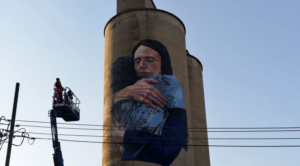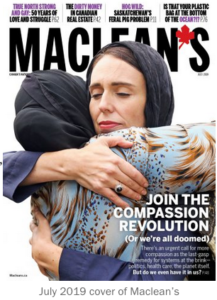
A photograph of the NZ PM embracing a Muslim woman reproduced by artist Loretta Lizzio as an 18-metre mural on a silo in Melbourne (Recep Sakar/Anadolu Agency/Getty Images)
Steve: It’s amazing to read something from even last year blowing the whistle on our lack of social bondedness and to compare it with our situation now.
The deep state’s drive to divide and conquer us has resulted in a pandemic and lockdowns around the world. Broach this scenario a year ago and no one would have believed it. Science fiction? Or better still: Conspiracy theory.
Steve: This is what I mean when I say that we’re becoming socially isolated.
It’s going to take some people (lightworkers) setting new patterns and leading the way to reverse the flow towards a lack of social bondedness.
If events were left to themselves, I think we’d continue to drift towards isolation and self-servingness.
Of course the energies will decide the issue over the long run. We simply feel the need to act now.
The world is broken—and human kindness is the only solution.
From politics to health care to economics, a rising movement is calling for compassion as a remedy for systems on the brink
Anne Kingston, Macleans, June 19, 2019
httpss://www.macleans.ca/society/the-world-is-broken-and-human-kindness-is-the-only-solution/
In February, Canadians received a rude wake-up call about the lack of compassion of some Ontarians. After a late-night Amber Alert chimed on cellphones signalling the abduction of 11-year-old Riya Rajkumar, some people turned to social media, not to express concern for a child in peril (Rajkumar was later found murdered), but to vent about having their sleep disturbed.
Others called 911 to complain, jamming lines for people with real emergencies. The angry blowback to the blowback was swift. Yet an identical cycle was unleashed during another Amber Alert a few months later (happily, the three-year-old boy was found safe).
The selfish reaction to the alert was upheld as more proof of dwindling societal empathy, of “me-first” narcissism, of the further tattering of the social contract that citizens share. The reaction to the reaction was telling, too—reflexive judgment, mockery and name-calling. The entire dust-up serves as a microcosm of a far bigger conflict now playing out: the urgent call for compassion as the last-gasp remedy for systems on the brink—politics, health care, civil society, the planet itself.

The public hunger for compassion in politics registered in March with the rapturous praise heaped on New Zealand Prime Minister Jacinda Ardern for her empathetic response after the horrific attacks on Christchurch mosques that killed 51 and injured dozens. Ardern’s first words, “As-Salaam-Alaikum,” a Muslim greeting meaning “Peace be upon you,” were followed by a bid to unify: “We feel grief, we feel injustice, we feel anger, and we share that with you.” She offered more than “thoughts and prayers”: her government gave financial assistance to help families with burial expenses, then passed legislation to ban most semi-automatic weapons. A photograph of the PM embracing a Muslim woman went viral—reproduced by artist Loretta Lizzio as an 18-metre mural on a silo in Melbourne, and illuminated on a Dubai skyscraper.
READ: New Zealand reacted to the tragic mosque killings with deep humanity
Ardern, and her call for “kindness over fear,” as she put it in a United Nations address last fall, is viewed by many as a flower growing through concrete at a time of rising isolationism, tribalism, racism and authoritarianism. Cruelty is used to divide and win votes—Donald Trump mocking a disabled New York Times journalist, Boris Johnson, a front-runner for British PM, objectifying Muslim women.
The U.S. government has literally institutionalized cruelty, caging migrant children and arresting “Good Samaritans” helping ailing migrants at the Mexican border. Austerity programs, including those in Ontario, are targeting the vulnerable—the poor, children, those on the margins. The divisive, toxic political climate gave rise to the British group Compassion in Politics, founded last fall by activists and academics. “People look at British politics and see a lack of compassion in policy on refugees, immigration, housing, Brexit,” group co-founder Matt Hawkins tells Maclean’s. Forty years of neo-liberal, free-market policies created widening inequities, falling incomes and a sense of desperation, he says. “There’s frustration with a political system that puts party above universal progress, majorities in Parliament over collaboration.” Support has been overwhelmingly positive, Hawkins says, including from the moral philosopher Peter Singer and Noam Chomsky; there’s interest in Australia and they’reliaising with Ardern’s office. In May, a cross-party group of British MPs called for legislation to contain a “compassion threshold.”
The loudest cries for compassion, tellingly, are heard within systems literally created to care for people. Compassionomics: The Revolutionary Scientific Evidence that Caring Makes a Difference, by American physician-scientists Stephen Trzeciak and Anthony Mazzarelli, published in April, is the latest book to sound the alarm about systemic inhumanity within “patient-based” medicine. The authors identify a “compassion crisis” in U.S. health care; treating patients more kindly, they argue, improves health outcomes, reduces doctor burnout and lowers costs.
Canada is in similar straits, Toronto physician Brian Goldman, author of the 2018 bestseller The Power of Kindness: Why Empathy is Essential in Everyday Life, tells Maclean’s. “We’ve designed a system that edits out empathy, that makes it almost impossible.” Something has to crack, Goldman says: “We’ve reached the limit of the myth of the superman-superwoman [doctor] who can juggle 10 things at once.”
RELATED: Scott Gilmore: Amber Alert whiners are horrible people
James Doty, founder of Stanford University’s Center for Compassion and Altruism Research and Education, speaks in similarly urgent terms. Doty, a medical doctor and professor of neuroscience, links a societal lack of compassion to a slew of ills, personal and political—epidemic levels of stress, anxiety and depression, bullying, crime, growing wealth and health inequality, more children growing up in poverty. Like the Compassionomics authors, Doty presents compassion as a value proposition: “It’s estimated that businesses lose well over $200 billion secondarily to anxiety and depression, which translates into decreased productivity, decreased creativity, increased health care costs and increased human resources costs,” he says. Work he and others are doing, he says, reveals the power of compassion and caring in myriad ways, beginning with self-empowerment. Promoting the return on investment of compassion is one way to get the attention of a selfish world. Now the question is: How do we foster compassion within systems designed to reward those who aren’t compassionate?
AS DOTY DESCRIBES IT, the personal and political are deeply enmeshed: “The ills of the world are a manifestation of individuals’ responses to wounds of the heart that haven’t healed,” he says. “When people are hurt and damaged, that has a huge impact on how they interact. You can even take it into the justice system. I say the majority of people are in jail not because they are bad people; they’re in jail because they were not cared for and loved.”
His own story illustrates how it only takes one person to change a life. Doty was raised amid instability, he says; his father was an alcoholic, his mother, paralyzed by a stroke, was suicidal; the family lived on social assistance and was often evicted from their home. “When you grow up in an environment like that, you quickly see the good and bad in people. As a child, I struggled with what motivates people to be kind, empathetic and compassionate, and also what it is that stops people from doing that. That has remained with me.” His life changed at age 12 by a simple act of kindness. Visiting a magic store, he fell into conversation with the owner; she went out of her way to help him rethink the way he saw the world—that his background coloured the way he interpreted events, and that he could alter his internal dialogue to not harbour anger, shame or despair, he says: “I felt hopeful for the first time.” He went on to a successful career in medicine, including stints in the U.S. Army and in the tech sector. In 2007, he returned to Stanford and proposed to study compassion. He was told it was a “dead end” academically—a “soft” topic no one took seriously. Doty founded the centre in 2008 with his own money—outside contributors included the Dalai Lama.
READ: Can compassion successfully challenge the status quo on health?
By then, the quest for compassion and empathy was a micro-industry, a self-help sub-genre. Its credibility was linked to the mainstreaming of “mindfulness,” attentiveness to the present moment that’s clinically proven to alleviate chronic pain and stress and improve performance. The market for “how-to” compassion books was growing: the Dalai Lama’s 2001 book, An Open Heart: Practicing Compassion in Everyday Life, was a bestseller.
Of course, the world’s religions are underlined by human kindness, or agape, Greek for “love of mankind.” A more secular society receives its sermons via TED Talks, as the psychologist Daniel Goleman, author of Emotional Intelligence, noted in his own 2007 TED Talk titled “Why Aren’t We More Compassionate?” He made it clear the reason wasn’t a lack of TED Talks: “I’m struck by how one of the implicit themes of TED is compassion.”
Neuroscience—brain-mapping fMRI scans that revealed how compassion and empathy can change us physically and mentally—conferred an evidence-based imprimatur. The discovery that mirror neurons are triggered in our brain when we see someone who’s sad, angry or happy provided insight into empathetic responses—and helped explain the payback of “compassion begetting compassion.” The Oxford Handbook of Compassion Science, published in 2017, was the first collection of academic research on the topic. “It’s science, it isn’t ‘woo woo,’ ” says Doty. (Oxford is home to its own multidisciplinary empathy centre—the Empathy Programme.)
Animal-rights advocacy also shaped our understanding of compassion, and human nature. Marc Bekoff’s 2010 The Animal Manifesto: Six Reasons for Expanding Our Compassion Footprint argues that the competitive “nature, red in tooth and claw” paradigm doesn’t reflect how animals interact co-operatively; it also casts light on the fact that Charles Darwin also believed that animals, like humans, could be emotional, empathetic and moral beings—and that co-operation and caring shaped the course of evolution as much as competition and ruthlessness. “Ruthlessness allows for self-benefit, but it’s not a long-term survival strategy,” says Doty. Most people behave co-operatively, he says: “That’s how society survives. Otherwise you’d have anarchy.”
Goldman’s The Power of Kindness provides a tour of the thriving global compassion complex—he takes readers from a lab at Université Laval (“Mecca for brain research on empathy”) to Japan to engage with empathetic androids. Ironically, development of artificial empathy in companion robots able to detect and respond to human emotion has cast light on empathy’s presence (and absence) in humans.
Within the compassion sector, a line is being drawn between the utility of empathy, which is feeling and understanding another’s emotions, and compassion, which involves action. Yale psychology professor Paul Bloom argues the point in his 2016 book Against Empathy: The Case for Rational Compassion. Cognitive bias makes us more likely to “feel” for those with whom we identify or find attractive—typically those seen to be innocent and defenceless, Bloom writes. But true compassion requires helping those with whom we don’t relate. That, in fact, defines it.
(Read more….)

